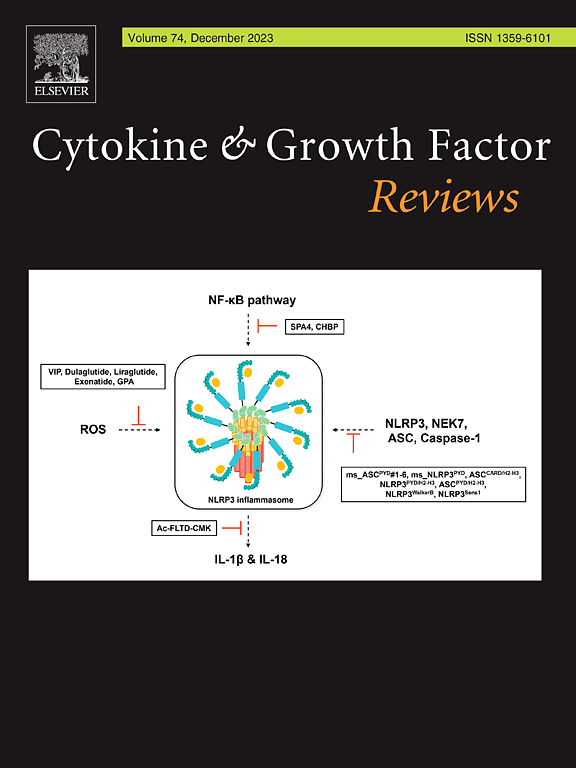JAK inhibitors in immune regulation and treatment of vitiligo
IF 11.8
2区 医学
Q1 BIOCHEMISTRY & MOLECULAR BIOLOGY
引用次数: 0
Abstract
Vitiligo, a disorder marked by hypopigmentation, significantly impacts patients' quality of life and mental health. This condition results from the reduction or dysfunction of melanocytes, which are crucial for skin and hair pigmentation. Current treatments include glucocorticoids, immunosuppressants, phototherapy, vitamin D3 analogues, and surgical interventions. Recent research has revealed that hyperactivation of Janus kinase (JAK) and its downstream signaling pathways intensifies cytotoxic T cell activity and weakens melanocytes' defense against environmental stressors. Additionally, the aberrant expression of pro-inflammatory cytokines such as Interferon-gamma (IFN-γ) and Tumor Necrosis Factor-alpha (TNF-α) plays a critical role in the pathogenesis of vitiligo by disrupting melanocyte function and promoting immune-mediated destruction. Clinical trials and basic research have demonstrated the efficacy of JAK inhibitors in modulating these cytokine pathways and promoting melanocyte repigmentation. This review provides a comprehensive analysis of JAK inhibitors, exploring their mechanisms and latest applications in regulating cytokine and skin immune responses, aiming to optimize their use in vitiligo therapy.
JAK 抑制剂在免疫调节和白癜风治疗中的作用。
白癜风是一种以色素脱失为特征的疾病,严重影响患者的生活质量和心理健康。这种疾病是由黑色素细胞减少或功能障碍引起的,而黑色素细胞对皮肤和毛发的色素沉着至关重要。目前的治疗方法包括糖皮质激素、免疫抑制剂、光疗、维生素 D3 类似物和手术干预。最近的研究发现,Janus 激酶(JAK)及其下游信号通路的过度激活会增强细胞毒性 T 细胞的活性,削弱黑色素细胞对环境应激源的防御能力。此外,干扰素-γ(IFN-γ)和肿瘤坏死因子-α(TNF-α)等促炎细胞因子的异常表达,通过破坏黑色素细胞功能和促进免疫介导的破坏,在白癜风的发病机制中起着至关重要的作用。临床试验和基础研究证明,JAK抑制剂在调节这些细胞因子通路和促进黑素细胞再色素沉着方面具有疗效。本综述全面分析了JAK抑制剂,探讨了它们在调节细胞因子和皮肤免疫反应方面的机制和最新应用,旨在优化它们在白癜风治疗中的应用。
本文章由计算机程序翻译,如有差异,请以英文原文为准。
求助全文
约1分钟内获得全文
求助全文
来源期刊

Cytokine & Growth Factor Reviews
生物-生化与分子生物学
CiteScore
21.10
自引率
1.50%
发文量
61
审稿时长
22 days
期刊介绍:
Cytokine & Growth Factor Reviews is a leading publication that focuses on the dynamic fields of growth factor and cytokine research. Our journal offers a platform for authors to disseminate thought-provoking articles such as critical reviews, state-of-the-art reviews, letters to the editor, and meeting reviews.
We aim to cover important breakthroughs in these rapidly evolving areas, providing valuable insights into the multidisciplinary significance of cytokines and growth factors. Our journal spans various domains including signal transduction, cell growth and differentiation, embryonic development, immunology, tumorigenesis, and clinical medicine.
By publishing cutting-edge research and analysis, we aim to influence the way researchers and experts perceive and understand growth factors and cytokines. We encourage novel expressions of ideas and innovative approaches to organizing content, fostering a stimulating environment for knowledge exchange and scientific advancement.
 求助内容:
求助内容: 应助结果提醒方式:
应助结果提醒方式:


